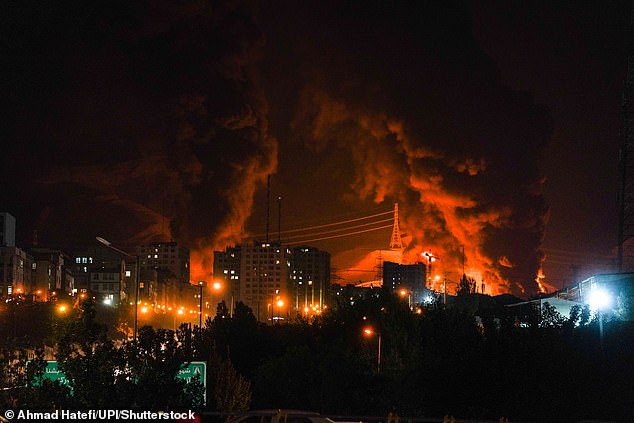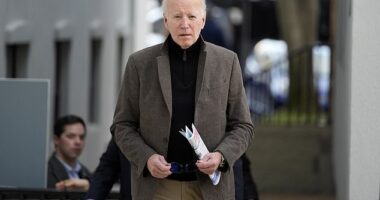The world is watching in horror as Israel and Iran spiral into a brutal exchange of strikes that has seen US-made warplanes batter targets across the Islamic Republic while hypersonic and ballistic missiles rain down over Tel Aviv.
Now, as the death toll rises and the risk of a wider regional war grows by the hour, the international community is urging restraint, but not without expressing support for one side or the other – some more vigorously than others.
Many have made their positions clear.
Iran’s proxy forces and allied militias have issued scathing condemnations of Israel’s actions, along with Turkey and much of the Arab world. The US and Europe meanwhile have backed Israel’s ‘right to self-defence’, albeit with varying levels of enthusiasm.
But the conflict has also exposed nations whose self-interest appears to outweigh loyalty to traditional allies.
For example, Russia’s ongoing war in Ukraine has been made possible by enduring support from Tehran, and the two signed a sweeping strategic partnership in January to formalise their military and political alignment.
Yet the Kremlin, while denouncing Israel’s assault, has stopped short of backing Iran. Instead, Moscow is manoeuvring to present itself as a regional power broker.
A statement at the weekend reminded Tehran that ‘the US is ready to hold another round of talks with Iran on the latter’s nuclear programme in Oman’ – while Vladimir Putin personally telephoned the White House on Saturday to offer himself as a mediator.
Here’s a breakdown of the international reaction as the Middle East’s most powerful foes come to blows – and a look at who stands where.
Iran has for decades used its so-called Axis of Resistance – a collection of political-military groups funded, armed and backed by Tehran – to expand its influence and advance its interests throughout the Middle East.
Unsurprisingly, each one of these groups has harshly condemned Israel’s strikes and pledged its support to its chief backer.
But only one member of the group – Yemen’s Houthi group known as Ansar Allah – has openly committed to striking Israel on Iran’s behalf.
Yemen
Yemen has been decimated by civil war between the Houthis and the internationally recognised government. Ansar Allah is now in control of vast swathes of the country and is allied with Iran.
The Houthis have launched intermittent attacks on Israel ever since the Jewish state’s declaration of war against Hamas in response to the October 7, 2023 attacks.
They have also managed to significantly disrupt global shipping by sending missiles, drones and even fast boats to intercept cargo ships in the Red Sea.
A spokesperson for the group on Friday told Newsweek: ‘We have been at war for some time with the Zionist enemy entity,’ before vowing to continue attacking Israel in the wake of Operation Rising Lion against Iran.
Hours later, air raid sirens in Israel blared following the launch of a missile from Yemen which ultimately landed in Hebron – a city in the West Bank under partial Israeli control.
Gaza and Lebanon
The other key members of the resistance – Hamas in Gaza and Hezbollah in Lebanon – issued scathing retorts to Israel’s strikes. But neither group volunteered to fight back in solidarity.
This is a testament to the efficacy of Israel’s military operations, which have significantly eroded the capacities of both Hezbollah and Hamas.
Hezbollah last year suffered a vital blow as thousands of its members were killed or injured when their communications devices exploded in their hands – the product of a stunning operation by Mossad.
This, plus a campaign of punishing airstrikes that eliminated senior leadership, including longtime chief Hassan Nasrallah, forced the Lebanese outfit to strike a peace deal with Israel in November.
Lebanon’s president Joseph Aoun is keen to limit any involvement of his nation in the conflict, warning that any engagement would be detrimental given that the country is still mired in economic crisis and struggling to recover from Israel’s bombardment against Hezbollah last year.
Hamas meanwhile has suffered horrific losses amid the ongoing war in Gaza, with Israel having bombed much of the territory into rubble and killed most of its senior leadership.
Iraq
Iraqi Prime Minister Mohammed Shia al-Sudani condemned Israel’s attack on Iran, declaring: ‘The recent aggression against Iran poses a direct threat to the security and stability of Iraq and the region.’
Iraq also submitted a complaint to the United Nations Security Council over Israel’s violation of its airspace to conduct its attacks.
There are a smattering of other Shia Islamist militias, including the likes of the Islamic Resistance in Iraq (IRI) and Ka’taib Hezbollah, that are supporters of the Islamic Republic and would likely fight on behalf of Tehran in event of an all-out war.
But it is believed their leaders have been warned by Iraq’s central government to avoid getting involved in the conflict.
Turkey
Turkish President Recep Tayyip Erdogan harshly condemned Israel’s actions against Iran and warned against a ‘devastating war’ between the two, adding that such an event could trigger yet another major refugee crisis.
A statement from Erdogan’s office later said the president called his Iranian counterpart Masoud Pezeshkian and blamed Israel for ‘wanting to drag the whole region into the fire’.
Turkey on Monday also issued a joint statement with Russia after President Erdogan spoke with his opposite number in Moscow, Vladimir Putin, which denounced Israel’s act of force’ against Tehran.
Russia’s take on the conflict however is more nuanced.
Russia
The position of Russia, whose President Putin is evidently keen to inextricably insert himself into Israel and Iran’s affairs, is tied closely to its war in Ukraine.
Not only does the conflict between Tehran and Jerusalem distract from the Russian armed forces’ incessant assault on Ukraine’s territory, but a successful resolution of the Israel-Iran hostilities thanks to Russian mediation would be hugely beneficial for Moscow’s profile on the world stage.
It would also likely earn Putin a significant amount of good grace from his American counterpart for ongoing ceasefire negotiations in Ukraine.

Fire and smoke rise into the sky after an Israeli attack on an oil depot in Tehran, Iran, at dawn on Sunday, June 15, 2025

The Iron Dome, the Israeli air defense system, intercepts missiles fired from Iran, over Tel Aviv, Israel, 16 June 2025

Damaged residential buildings after Iranian ballistic missiles hit Bat Yam, central Israel, 15 June 2025
Much of the Arab world has publicly denounced Israel’s attacks on Iran.
But the support of these countries for Tehran is unlikely to extend beyond words given their relationships with the United States and their desire to expand their own influence in the region.
Many of these countries, including Egypt, Saudi Arabia, Jordan, Qatar and the UAE, are also majority Sunni Muslim, split across sectarian lines from Iran’s Shia majority population.
Saudi Arabia
Saudi Arabia’s foreign ministry said the Israeli attacks against Iran ‘constitute a clear violation of international laws and norms’ and went on to condemn the ‘heinous attacks’.
Crown Prince Mohammed bin Salman also spoke directly with Iran’s President Masoud Pezeshkian to ‘express condolences and sympathy’, but added that Saudi Arabia ‘rejects the use of force to resolve disputes’.
Jordan
Israel’s neighbour Jordan was forced to intercept Iranian drones and missiles headed for Israel after Tehran retaliated.
But it also issued a stern warning that it would not allow any Israeli air assets to enter its airspace and ‘strongly’ condemned Jerusalem’s attacks against Tehran.
‘The Kingdom didn’t and will not allow any violation of its airspace, and it will not be a battlefield for any conflict,’ government spokesman Mohammad Al-Momani said.
‘The safety of the homeland is a red line… The Kingdom will not allow any attempt to threaten its security and the safety of its citizens.’
Egypt
Another of Israel’s neighbours, Egypt took the lead in denouncing Israeli strikes, penning a statement that was signed by 21 countries and highlighted the ‘imperative need to halt Israeli hostilities against Iran’.
The statement, initiated by Egypt following consultations between Foreign Minister Badr Abdelatty and his counterparts, expressed a ‘categorical rejection and condemnation of Israel’s recent attacks on the Islamic Republic of Iran since the 13th of June 2025.’
UAE
The United Arab Emirates has condemned ‘in the strongest terms Israel’s military targeting of the Islamic Republic of Iran’, and expressed its ‘deep concern’ over the escalation and its repercussions on regional security and stability.
Qatar
Qatar’s Prime Minister declared that Israel’s ‘absurd actions’ continue to ‘destroy prospects for peace’ and put global security in ‘imminent danger’.

An attempt to intercept a missile launched from Iran is made, as seen from Hebron, in the Israeli-occupied West Bank, June 17, 2025

The Iranian State Radio and Television (IRIB) building was hit by an Israeli strike on Monday, briefly interrupting the channel’s live broadcast

Israeli security forces inspect a site hit by a missile launched from Iran in central Israel on Tuesday, June 17, 2025

Smoke billows from a fire in a building in Herzliya near Tel Aviv following a fresh barrage of Iranian missiles on June 17, 2025
Pakistan
In a disquieting development, nuclear-armed Pakistan not only harshly criticised Israel’s strikes but warned that it would deploy its thermonuclear weapons against the Jewish state should the Israeli military use any of its own nuclear devices on Tehran.
Syria
The fall of former Syrian President and close ally of Iran Bashar al-Assad has dramatically weakened Iran’s regional support base.
Under the leadership of Sunni Islamist group HTS, Syria severed ties with Iran and is now seemingly committed to preventing the flow of funds and arms from Tehran to Hezbollah in Lebanon.
Syria’s new leader Ahmed al-Sharaa has remained silent on the subject.
China
Beijing initially condemned Israel’s attack on Iran, but later warned that the Iran-Israel conflict could spiral out of control and has called on both sides to de-escalate.
‘If the conflict between Israel and Iran continues to escalate or even spill over, the other countries in the Middle East will inevitably bear the brunt,’ Chinese Foreign Ministry spokesman Guo Jiakun said Monday.
‘China will continue to maintain communication with relevant parties and promote talks for peace, so as to prevent more turmoil in the region.’
Israel is thus far going it alone in its assault on its arch nemesis, with no country openly taking part in attacking Iran on its behalf.
But it has a slew of powerful enemies that have expressed support for Israel’s right to self-defence.
Others have generally warned against an escalation in the conflict but have not condemned Israel’s actions – and all are quietly thankful for Operation Rising Lion amid fears Iran was closing in on developing nuclear weapons.
United States
President Donald Trump had for months cautioned Israel against attacking Iran as he attempted to negotiate with the Islamic Republic, offering sanctions relief in exchange for Tehran abandoning its nuclear enrichment programme.
But in the days before the launch of Operation Rising Lion, he reportedly became convinced of the need for Israel to strike – and was convinced on Thursday when the UN’s nuclear watchdog officially warned that Iran was in breach of its nonproliferation requirements.
In the wake of the attacks he urged Iran to ‘make a deal’ with the US to avoid more bloodshed and at the weekend told reporters that it was ‘possible’ Washington could get involved.
‘There has already been great death and destruction, but there is still time to make this slaughter, with the next already planned attacks being even more brutal, come to an end. Iran must make a deal, before there is nothing left,’ he said. He also quipped that Israel’s punishing attacks ‘may have forced a deal to go quicker, actually’.
In the meantime, Washington appears to be taking steps to stabilise the situation – and discourage Iran from further aggression.
The USS Nimitz aircraft carrier, set to appear in Vietnam on June 20, has seemingly reversed course and his now heading back West, presumably on course for the Middle East.

Firefighters and rescue personnel work at an impact site following missile attack from Iran on Israel, in Tel Aviv, Israel June 16, 2025

Iran’s ongoing retaliatory attacks with ballistic missiles towards Israel are seen from Hebron, West Bank on June 16, 2025

Rescue teams clear rubble in a neighbourhood in the northern Israeli village of Tamra, following an overnigh missile attack from Iran on June 15, 2025
Britain
British Prime Minister Sir Keir Starmer issued a general caution against further hostilities in the hours following initial attacks on Friday.
‘Stability in the Middle East must be the priority, and we are engaging partners to de-escalate… Now is the time for restraint, calm and a return to diplomacy,’ he said.
But in a phonecall, Starmer told Israeli Prime Minister Benjamin Netanyahu that London believes Israel has the right to ‘self defence’ and has ‘grave concerns’ over Iran’s nuclear programme.
France
Paris took it a step further, with President Emmanuel Macron declaring that Tehran bore ‘heavy responsibility in the destabilisation of the whole region’.
‘If Israel were to be attacked in retaliation by Iran, France, if in a position to do so, would take part in protection and defence operations,’ he said – though he added that Paris would not take part in any offensives on Iran.
Germany
Chancellor Friedrich Merz backed ‘Israel’s right to defend its existence and the security of its citizens’, adding: ‘The goal must remain that Iran does not develop nuclear weapons.’
Other Western aligned nations including Canada, Australia and Argentina equally denounced Iran’s pursuit of nuclear weapons and perceived role in destabilising the region.
Argentina
Argentine President Javier Milei took an opposing tack to neighbouring Brazil, siding with Israel and condemning Iran’s vile attack.
Milei’s office also hit out at Iran’s appointment of Brigadier General Ahmad Vahidi as the new head of the Revolutionary Guard following the assassination of Hossein Salami.
Vahidi is one of several Iranian military members that Argentine authorities believe are responsible for the bombing of a Jewish community centre in Buenos Aires in 1995 – a terror attack in which 85 people perished.
Beyond this, most countries have either issued general calls for de-escalation and restraint, without coming down on either side.
But there was one notable abstainer from condemning Israel’s attacks.
India
Prime Minister Narendra Modi’s government refused to join its fellow members of the Shanghai Cooperation Organisation (SCO), a pan-Asian political and security bloc, in doing so.
New Delhi is playing a balancing act as a leading purchaser of Israeli military technology and defence equipment, but also as a key economic partner of Iran – not to mention its robust relationship with the United States.









